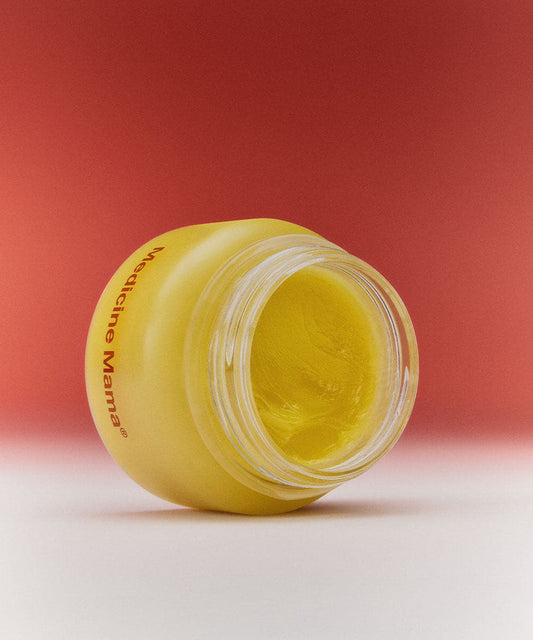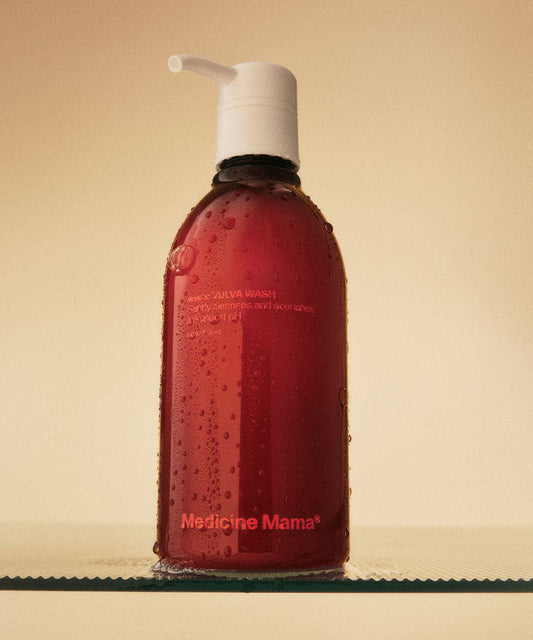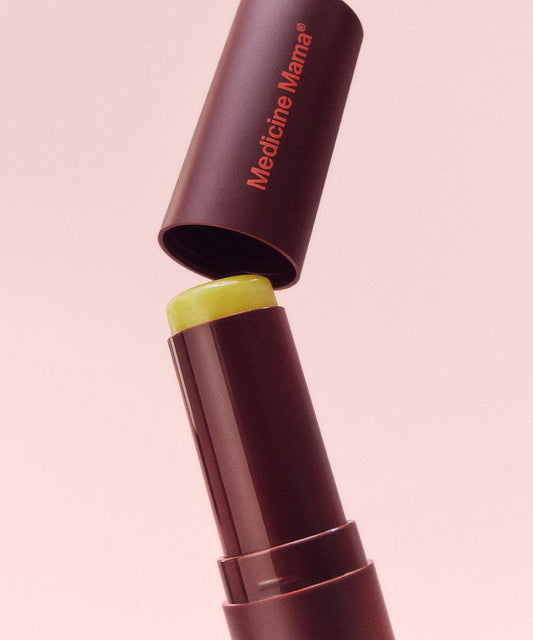Reviewed by | Dr. Clare Bertucio MD
Ever felt like your body just isn’t cooperating like it used to? You’re definitely not alone. Vaginal atrophy might sound daunting — a term many might shy away from — but it's a reality for countless women, particularly as they navigate the complexities of menopause.
At Medicine Mama, we're here to shine a light on these shadowy topics, empowering you with knowledge and solutions. So, let’s break down what vaginal atrophy really means and explore how you can address it with confidence and care.
What Is Vaginal Atrophy?
Vaginal atrophy, or genitourinary syndrome of menopause (GSM), is more than just a discomfort — it's a common condition that many women experience but few openly discuss. As estrogen levels decline during menopause, several changes can occur in the vaginal area, affecting your lifestyle in various ways.
Here's a closer look at the typical symptoms:
- Vaginal Dryness: Often the first sign of vaginal atrophy, creating a sense of tightness or lack of moisture that's hard to ignore.
- Itching and Burning: These uncomfortable sensations are clear indicators of the thinning and drying of vaginal tissues.
- Discomfort During Sexual Intercourse: Reduced lubrication can lead to painful encounters, turning intimacy into a challenge.
- Light Bleeding After Intercourse: The delicate tissues may tear more easily, which can sometimes cause bleeding.
- Frequent Urinary Tract Infections: The thinning of both vaginal and urinary tract tissues can lead to an increased risk of infections.
- General Discomfort: Even daily activities or light exercise can feel uncomfortable due to heightened sensitivity and dryness.
It's important to remember that symptoms can vary widely, highlighting the unique nature of each woman's experience with vaginal health.
What Causes Vaginal Atrophy?
Vaginal atrophy arises from a variety of factors, each playing a role in changing the landscape of vaginal health. Let's break down these influences to better understand the shifts that might be happening in your body.
Hormonal Changes
A key player here is the drop in estrogen levels. Estrogen is crucial for keeping vaginal tissue thick, moist, and elastic. As you hit menopause, or even during perimenopause, your ovaries start scaling back on this vital hormone, setting the stage for atrophy.
Menopausal Symptoms
While most are familiar with hot flashes and night sweats, the subtle yet profound effect of estrogen loss on vaginal tissues often goes unnoticed until discomfort becomes apparent. This estrogen depletion directly impacts the moisture and elasticity of the vaginal walls.
Medications and Treatments
Certain medications, particularly those involved in breast cancer treatments, can diminish estrogen levels as a side effect. Common over-the-counter remedies like antihistamines may also reduce mucous membrane moisture, including in the vaginal area.
Lifestyle Factors
Everyday choices play a significant role, too. Smoking can impair circulation, vital for tissue health, while insufficient hydration affects your body’s ability to maintain moist mucous membranes.
Lack of Sexual Activity
Regular sexual activity promotes blood flow to the genital area, supporting tissue health. Without this, vaginal tissues can lose their elasticity and vitality, adding to the symptoms of atrophy.
How Is Vaginal Atrophy Identified?
Getting to the bottom of whether it's vaginal atrophy starts with a candid chat with your healthcare provider. This isn't just about ticking off symptoms — it's about understanding your personal experience and how these changes are impacting your life.
From there, your doctor might suggest a pelvic exam to visually and physically assess the health of your vaginal tissues, looking for thinning, dryness, or inflammation that often accompanies this condition.
To get even clearer insights, a pH test may be performed to check the acidity in your vaginal environment — a higher pH level can be a telltale sign of atrophy. For those who might need a deeper dive, your gynecologist could recommend further testing like a vaginal smear test, which helps to evaluate the maturity of the vaginal cells and can influence the choice of treatment, whether it's local estrogen therapy or other management strategies.
By weaving together your history with these diagnostic tools, your healthcare provider can tailor a treatment plan that really resonates with your needs and starts paving the way to better comfort and health.
So, Can Vaginal Atrophy Be Reversed?
While we can't exactly "reverse" vaginal atrophy in the sense of completely turning back the biological clock, there's definitely good news. This condition — deeply tied to hormonal changes like decreased estrogen during menopause — doesn't have to diminish your quality of life. What we aim for is to manage the symptoms effectively and improve your comfort.
Through a combination of treatment options such as hormone therapies or topicals, many women find significant relief. These treatments help replenish moisture, enhance vaginal lubrication, and restore some elasticity to the vaginal tissues, reducing discomfort during urination or sexual activity.
So, while we might not "reverse" the condition outright, we can certainly dial back the clock on the symptoms and impact of vulvovaginal atrophy with the right approach.
How Can You Effectively Manage Symptoms of Vaginal Atrophy?
Living with vaginal atrophy doesn't have to be a daily struggle. With a splash of knowledge and a pinch of proactive care, you can keep the discomfort at bay and embrace life fully.
Here’s how you can turn the tide on vaginal atrophy, infusing each day with comfort and confidence:
Lubricate the Right Way
Navigating intimacy when you're experiencing dryness? A dash of water-based lubricant can transform your experience. It's like the secret sauce for smooth, enjoyable moments, reducing friction and enhancing pleasure without irritating your sensitive spots.
Moisturize Daily
Dryness down there is no joke, and vulva moisturizers are the perfect remedy. Just a little gentle, non-hormonal moisturizer in your intimate care routine can provide meaningful relief and support ongoing skin health.
Explore Hormonal Treatments
If the natural dip in estrogen is leaving you feeling less than fabulous, topical estrogen creams or hormone replacement therapy could be your ticket to better days. They work behind the scenes to plump up your vaginal tissues, keeping them lush and lively.
Strengthen With Pelvic Exercises
Think of pelvic exercises as your internal gym workout. Tightening and releasing these muscles not only boosts your control but also enhances the overall health of your pelvic floor, which can be a game-changer for both urinary and vaginal symptoms.
Opt for Cotton and Comfort
Your wardrobe can be a secret weapon against vaginal atrophy. Slip into something more comfortable, like cotton underwear, which lets your skin breathe and keeps irritants at bay.
Check In With Your Gynecologist
Make regular dates with your gynecologist — think of it as your personal health detective who checks in, keeps track, and tweaks your care plan so you're always on top of your game.
Educate and Empower
Knowledge is your power — learn about your body, understand the changes, and arm yourself with the info you need to make informed decisions about your health. It’s like turning on the lights in a dark room.
Manage Urinary Incontinence With Ease
If leaks are dampening your spirits, pelvic floor exercises, timed voiding, and even certain medications can keep you dry and confident, no matter what the day throws your way.
Maintain Regular Sexual Activity
Keeping things active in the bedroom isn’t just good for your relationship — it’s great for your vaginal health, too. Regular sexual activity increases blood flow, keeping your vaginal tissues healthy and elastic.
When Should You Seek Professional Advice?
When home remedies and self-care just aren't cutting it, it's time to call in the pros. If you're noticing persistent symptoms like severe dryness, discomfort during intimacy, or recurring urinary tract infections that don't improve with your usual routine, it's crucial to consult a healthcare provider. Unexplained vaginal bleeding or vaginal discharge also warrants a professional evaluation.
Remember, getting timely medical advice can prevent complications, provide more effective treatment options, and tailor strategies that specifically address your needs. It's all about keeping you comfortable and confident in your health journey.
Conclusion
At Medicine Mama, we're dedicated to empowering you with the knowledge to manage vaginal atrophy effectively. While we can't reverse the natural changes that come with menopause, our goal is to ensure you live comfortably and vibrantly despite these challenges.
With the right approach, you can maintain a wonderful quality of life. Join us as we continue to support and celebrate every woman's journey through all stages of life.
Let's embrace this chapter with confidence and care!
Disclaimer: The information provided on this blog is for general informational and educational purposes only. All content, including text, images, graphics, and other material, is not intended to be a substitute for professional medical advice, diagnosis, or treatment.
Always seek the guidance of your physician or other qualified health professional with any questions you may have regarding a medical condition, treatment, or wellness program. Never disregard the advice of a medical professional or delay in seeking it because of something you have read on this website.
Sources:
Vaginal atrophy - Symptoms & causes | Mayo Clinic
Vaginal Atrophy: Causes, Symptoms, Diagnosis & Treatment | Cleveland Clinic
How Smoking Affects the Heart and Blood Vessels | NHLBI, NIH
Genitourinary Syndrome of Menopause (Vaginal Atrophy) | Breast Cancer
Is sex exercise? And is it hard on the heart? | Harvard Health



